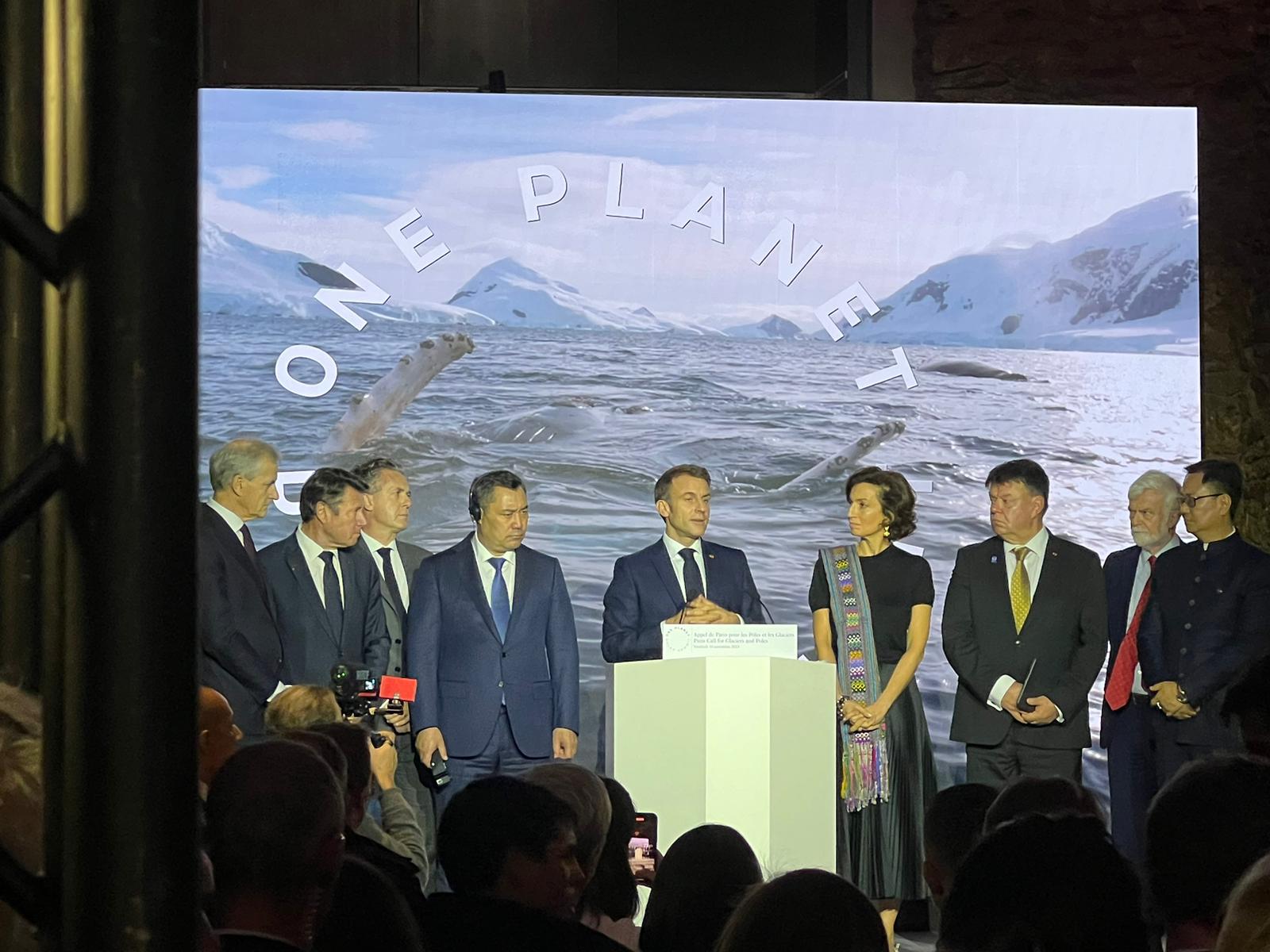
Faced with the accelerating metamorphosis of the cryosphere in polar and high-altitude regions, the recommendations made by scientists and NGOs stressed above all the urgency of drastically reducing greenhouse gas emissions and phasing out investment in fossil fuels in order to limit global warming to 1.5°C, while recognizing that this will not be enough to completely halt the disappearance of the ice.
The scientific community handed President Macron a series of recommendations, followed by those from NGOs - both stressing the need to support more in-depth scientific research into the cryosphere and better integration of the effects of cryospheric retreat into policy-making. "Science is your best partner," reiterated Jérôme Chappellaz, co-chairman of the Summit's Scientific Advisory Board. "Science has always provided solutions and innovations, but without stronger government intervention, it will be too slow," he said.
As a preamble to the Paris Call for Glaciers and Poles and before handing over their scientific report to President Macron, Antje Boetius and Jérôme Chappellaz - respectively Director of the Wegener Institute and President of the Ice Memory Foundation, both co-chairmen of the Summit's Scientific Council - underlined the urgency of preserving the ice memory for the scientific value and cultural heritage it represents for future generations.
Pascal Lamy, also brought the voice of civil society to the table through a series of recommendations from NGOs, notifying the importance of preserving the memory of glaciers, for the scientific, cultural and heritage value of indigenous populations.
In his address as Head of State, Prince Albert II of Monaco, Honorary Chairman of the Ice Memory Foundation, raised the importance of the initiative for the benefit of future generations.
In view of the objectives we are pursuing with the Ice Memory Foundation, the Paris Call for Glaciers and Poles includes some major announcements:
That is far more than the 450 million euros requested by the parliamentary working group. This budget seems to be allocated more for the poles than glaciers for the moment, as part of this budget will be allocated to renovating Antarctic polar stations, including the Franco-Italian Concordia Station, where the Ice Memory sanctuary will be located. This indirect support for the establishment of the sanctuary, scheduled for 2025-2026, comes on top of the Italian government's recent decision to also allocate a budget for the station's renovation.
Launch of the United Nations Decade for Polar and Glacial Sciences
This would begin in 2025. The International Year of Glacier Preservation would include the Fifth International Polar Year in 2032-33. An unprecedented decade supported by international institutions such as the World Meteorological Organization (WMO), the United Nations Educational, Scientific and Cultural Organization (UNESCO) and partner organizations such as the International Council for Science and the organizations of the Antarctic Treaty System.
Ice Memory is one of the "major projects already agreed", which will be a key part of the Decade.
A number of projects have already been finalized. The Ice Memory Foundation could be one of the flagship projects, along with a wide-ranging research project in Antarctica, focusing in particular on ice-ocean interaction. Following this presidential declaration, the Ice Memory Foundation's mission was officially included in the final declaration, recognized and supported by 32 signatory countries. It's a real victory for the Foundation, and not just a diplomatic one.
Protecting the most endangered natural areas at the poles and glaciers.
The fourth major announcement relates to the protection of French glaciers, which are to be upgraded to the status of natural areas in need of protection and placed "under strong protection". No other concrete elements have yet been put forward to support this announcement.
Thirty-two countries and two international organizations have joined the Call:
Australia, Bangladesh, Belgium, Bulgaria, Cape Verde, Chile, Cyprus, Comoros, Croatia, Estonia, France, Germany, Guinea, India, Italy, Japan, Kyrgyzstan, Liberia, Monaco, Montenegro, Pakistan, Peru, Singapore, South Korea, Spain, Switzerland, Tuvalu, Ukraine, United Kingdom, Uruguay.
United Nations Educational, Scientific and Cultural Organization (UNESCO); World Meteorological Organization (WMO).
In view of the Ice Memory Foundation's roadmap and the sites to be sampled as soon as possible, the commitment of Pakistan, Peru and Australia is most welcome. Let's hope that Canada and the United States will be able to demonstrate their interest in ice conservation at a later date, following the example of China which, although it has not signed the Paris Call, has joined the Ice Memory initiative within a specific collaboration of the Chinese scientific community. (read more on LinkedIn)
This Call represents an important first step. It is the crucial cornerstone of the diplomacy required to keep ice memory alive in the international community. Synonymous of future progress, this Call paves the way, offering to set new milestones between now and 2025, the International Year of Glaciers, and during the forthcoming meetings in which we will participate, to put Ice Memory on the political agenda as well as in the Decade of Polar and Glacial Research.
Facing the acceleration of glacier degradation, this political and governmental commitment at international level also calls for the mobilization of the private sector and the very needed philanthropic support of the Ice Memory Foundation. The stakes and the race against time call for a strong public and private commitment.
